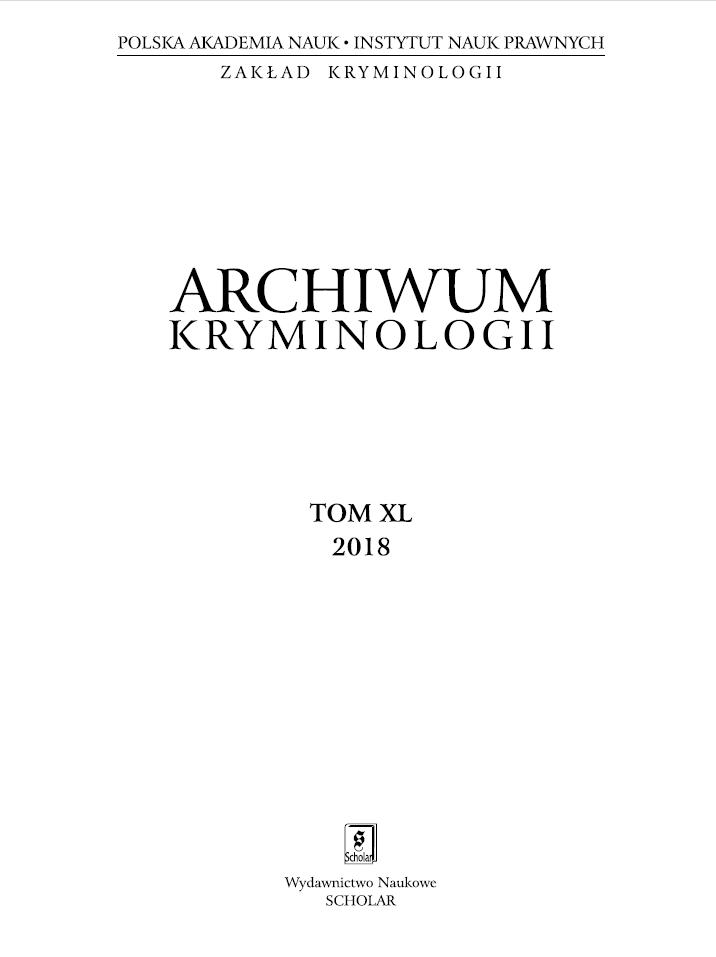Współpraca sądu dla nieletnich z instytucjami pomocniczymi w procesie orzekania
Cooperation of Juvenile Courts with Supporting Institutions in the Adjudication Process
Author(s): Justyna Włodarczyk-MadejskaSubject(s): Civil Law, Sociology of Law
Published by: Instytut Nauk Prawnych PAN
Keywords: juvenile courts; supporting institutions; adjudication process; professional probation officers; diagnostic teams; juveniles
Summary/Abstract: The article analyses the cooperation of juvenile judges with supporting institutionsin the adjudication process on the basis of the research project conducted at theDe partment of Criminology of the Institute of Law Studies of the Polish Academyof Sciences in 2016, entitled: “Cooperation of juvenile courts with other institutionsin the application educational and corrective measures”. The aim of the research projectwas to examine how juvenile courts practically implement the assumptions resultingfrom the Act on Proceeding in Juvenile Cases, especially its Article 32b, which providesthat juvenile judges have a duty to collect information about the juveniles and theirenvironment in the course of the proceedings – directly or indirectly (by the supportinginstitutions). The last of them have been defined as an organised team of institutionsthat cooperate with each other in order to achieve common aims. Cooperation hasbeen defined as “a type of social process to achieve a common aims”. In the courseof the project, two kinds of research were conducted. The first of them included nationalsurveys addressed to juvenile judges, professional family probation officers, expertsfrom diagnostic teams, the second – individual in-depth interviews with selectedrepresentatives of these groups. The national surveys comprised: 162 juvenile judges,556 professional family probation officers and 177 experts from diagnostic teams, whichaccounted for, respectively, 16%, 28% and 33% of total population for each of thesegroups. The individual in-depth interviews were conducted with 30 respondents,10 in each group.On the basis of the research, it can be assumed that, in general, the cooperationof juvenile judges with professional family probation officers and diagnostic teamsis good. This is an average value. It means that, in some courts, cooperation is more efficient than in others. The main evidence that provides knowledge about juvenilesis the environmental interview; 70% of judges declared that the order regarding thepreparation of an interview is issued in each case. None of them chose this categoryof answers in the question about the diagnostic opinion. Both the national survey andthe interviews demonstrate the lack of interdependence between the type of case andthe frequency of the order to prepare an environmental interview. This dependencyoccurs in relation to the diagnostic opinion. The probability of commissioning the pre -paration of such evidence is higher in cases in which the court intends to rule anisolation educational measure or corrective measure. There are different practicesof asking questions to the supporting institution. The questions, especially aboutthe cause and degree of demoralisation (88%), suggestions about the measure andthe direction of further impacts (86%), and personality characteristics of the juveniles(79.6%), are more often addressed to the diagnostic teams. The conducted researchconfirmed a high degree of convergence of the judgments with the recommendationsof the supporting institutions (an average 78.5% with diagnostic teams and 54.7% withprofessional family probation officers). Juvenile judges were asked to evaluate evidencecontaining information about the juveniles. The judges recognised the diagnosticopinion as the most helpful evidence in the decision-making process (87.7%); whereas85.8% of them also underlined the importance of the environmental interview. Thereis no doubt about nearly the same perception of the purpose of the functioning ofthe supporting institutions by the respondents of all the three surveyed groups. Theyagreed that these institutions are necessary and the juvenile justice system could notexist without them. These institutions provide information allowing conducting com -plete diagnoses of the juveniles and their environment, and thus determining themost needed measure; as such, they help to make the decision on the applicationof the most appropriate measure in each case. The article also includes theoreticalanalysis and analysis of the applicable regulations. Each of them confirms the existenceof assumptions and premises to create a “model system of proceeding with juveniles.”
Journal: Archiwum Kryminologii
- Issue Year: 2018
- Issue No: XL
- Page Range: 153-219
- Page Count: 67
- Language: Polish

